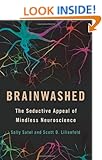 Sally Satel, one of the thinkers behind the puncture of the current neuro-balloon (your mind doesn’t exist, you don’t have free will, you just evolved to behave the way you do or think what you do … ), offers some critical distinctions:
Sally Satel, one of the thinkers behind the puncture of the current neuro-balloon (your mind doesn’t exist, you don’t have free will, you just evolved to behave the way you do or think what you do … ), offers some critical distinctions:
Philosopher-neuroscientist Joshua Greene and psychologist Jonathan Cohen contend that neuroscience has a special role to play in giving age-old arguments about free will more rhetorical bite. “New neuroscience will affect the way we view the law, not by furnishing us with new ideas or arguments about the nature of human action, but by breathing new life into old ones,” they write. “[It] can help us see that all behavior is mechanical, that all behavior is produced by chains of physical events that ultimately reach back to forces beyond the agent’s control,” Greene adds. Other neuroscientists hope to see a general attitude “shift from blame to biology.”
In some instances, such a move may be warranted, but to date, brain-based findings cannot distinguish between criminal impulses that are irresistible and those which are not resisted, difficult as resistance may sometimes be. Indeed, the relationship between brain-based explanations of behavior and what they mean for holding that person responsible is by no means straightforward. To be sure, everyone agrees that people can be held accountable only if they have freedom of choice. But there is a longstanding metaphysical debate about the kind of freedom that is necessary. Some contend that we can be held accountable as long as we are able to engage in conscious deliberation, follow rules, and generally control ourselves. That a long chain of physical causes that are beyond our control lead up to a crime does not undermine the law’s capacity, and duty, to blame and punish.
Unfortunately, she goes off on an “evolution” tangent that will undermine her argument completely. If the only reason we think something is that we evolved to think it (that is, there are no values “out there”), then whether it is a good thing to think or a bad one is a literally meaningless distinction: Justice is only as good or evil as injustice, take your pick.
And the people who rule are those who can make and enforce the rules, rules about which it is not meaningful to ask whether they make any sense. They want and they can, so they do.
That’s the world of “evolution,”* and someone is sure to point that out to Satel soon.
* The “evolutionist,” you see, is in on the ground floor. He gets to make and enforce the rules.